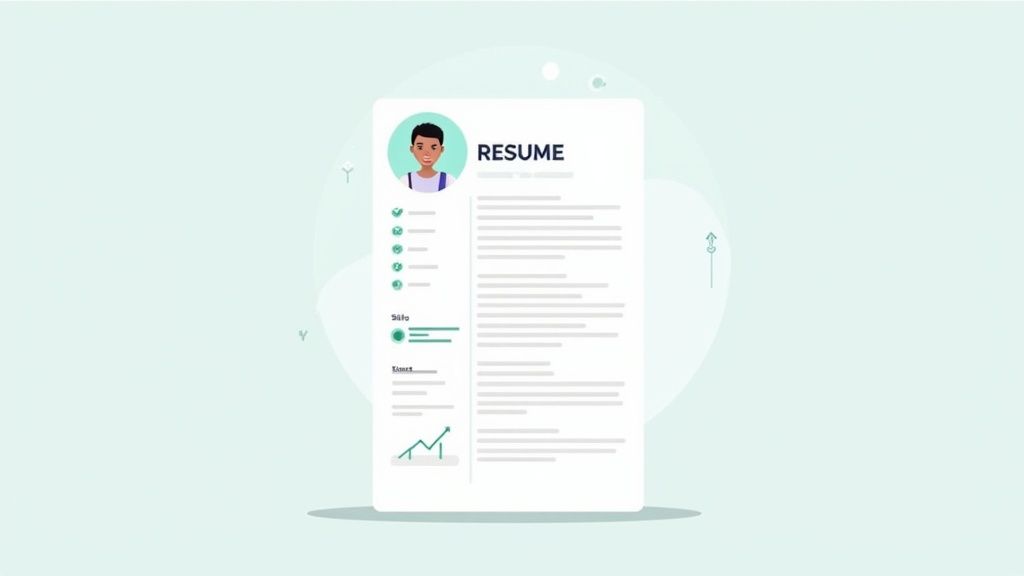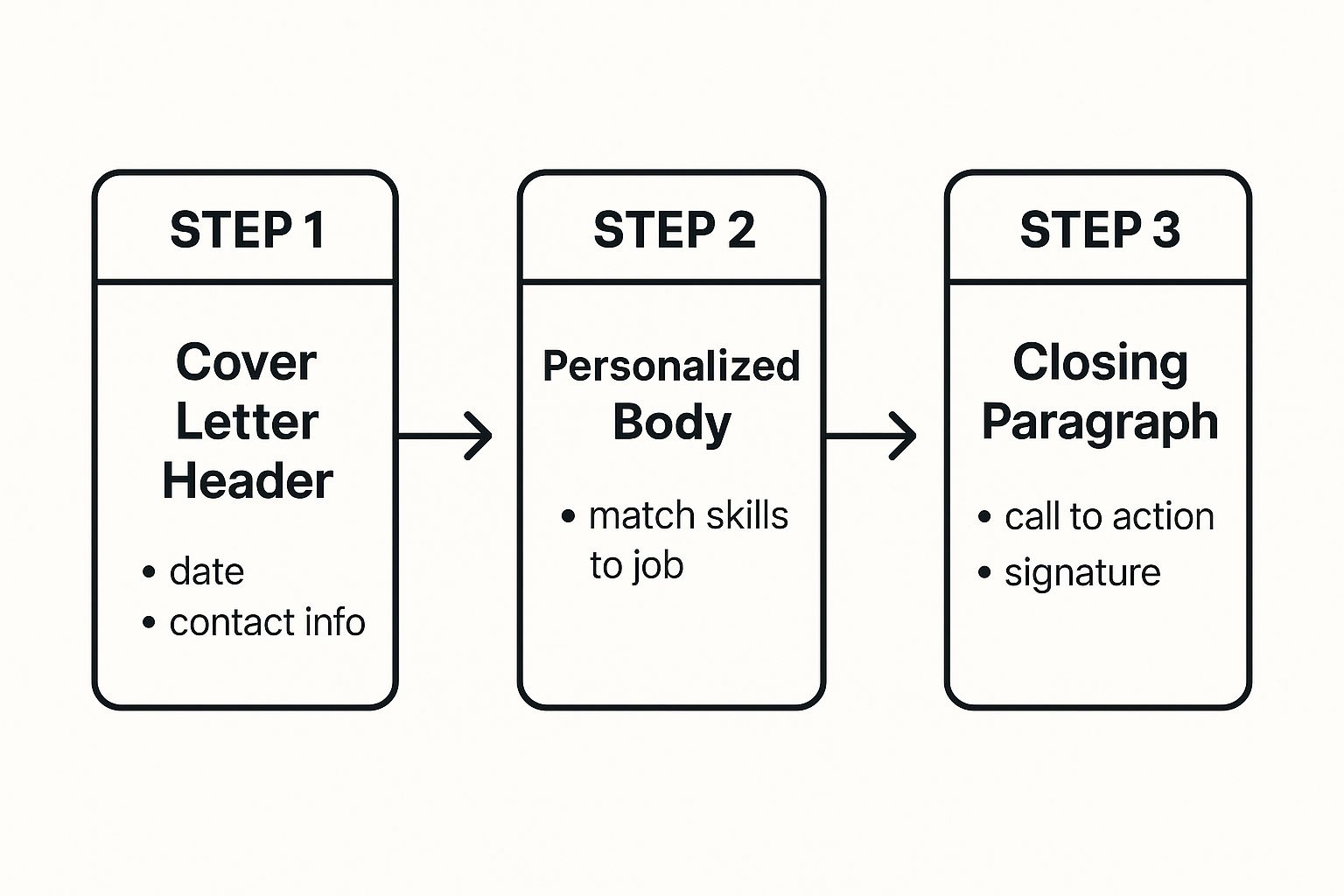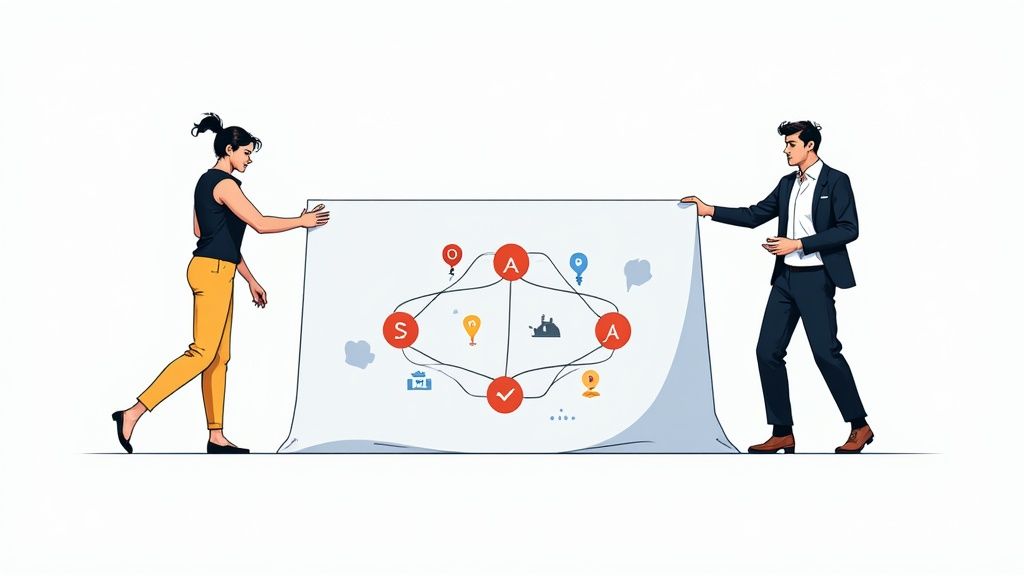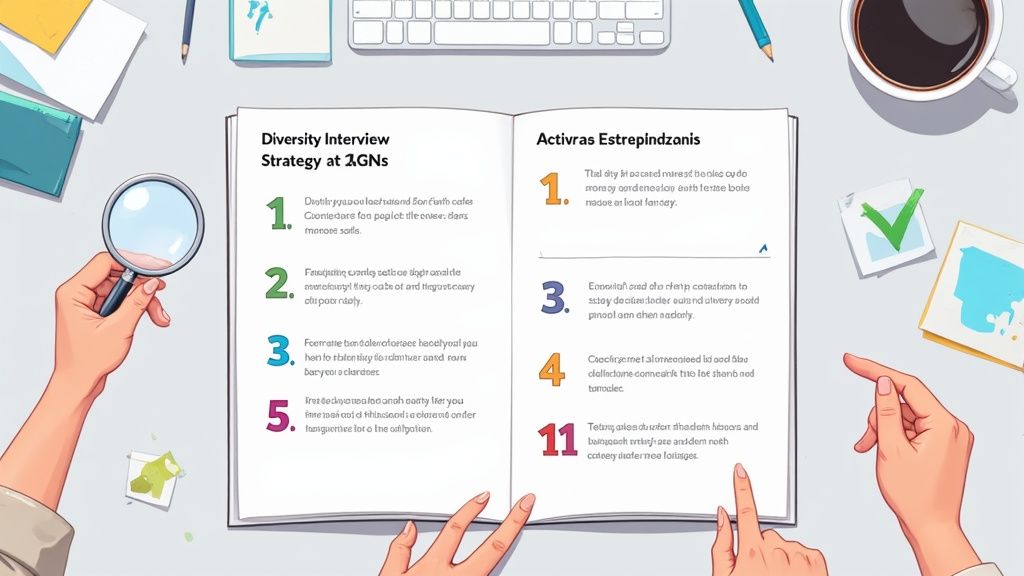Entry Level Job Search Tips: Land Your First Career

An effective entry-level job search isn't a numbers game—it's a strategic mission. It's about defining your career goals, building a powerful application toolkit, and applying smartly to roles where you can actually make an impact. Success comes down to a proactive mindset and a clear, actionable plan.
Decoding the Modern Entry-Level Job Market
Welcome to the starting line of your career. Kicking off an entry-level job search can feel like a lot, but understanding what's happening out there is the first real step toward building a confident, effective strategy. It's time to toss out the outdated advice. Let’s get into what hiring managers are really looking for in new grads and career-changers right now.
The job market is a living, breathing thing, constantly shifting with the economy and new technology. The key is to approach your search with a dose of realism, armed with current data and a good sense of where things are headed.
The Current Hiring Climate
While things have stabilized, the competition has definitely heated up. For 2025, employers initially planned a 7.3% bump in hiring new graduates but scaled that back to a more modest 0.6% rise because of the economic climate.
But don't let that number fool you—it's not a hiring freeze. A massive 89.2% of companies are planning to either maintain or increase their entry-level hiring. Plus, remote work continues to open up a ton of opportunities.
This tells us something important: the jobs are there, but they’re going to the candidates who are strategic and prepared.
"The problem isn't a lack of jobs, but a sea of unfocused applications. The people who get hired are the ones who truly understand what the market needs and align their skills and outreach to match."
Key Trends Shaping Your Search
A few big trends are dictating what employers care about most. As you navigate this new job market, it's critical to think about how things are changing and how technology is shaping the available roles. For a deeper dive, check out this article on understanding AI's impact on the job market.
To get ahead of the curve, you need to focus on what matters now:
- Skills Over Pedigree: More and more, companies care about what you can do—both your technical and people skills—not just the name on your diploma.
- Adaptability: Can you learn new software on the fly? Can you pivot when a project changes direction? Proving this is a huge plus.
- Proactive Networking: It's not just about who you know, but about building genuine connections. This is more valuable than ever.
Juggling all these moving parts requires organization. A good system is non-negotiable, which is why our guide on job search tracking is a great resource to help you stay on top of every application and follow-up.
Building Your Career Launch Kit

Before you even think about hitting "submit" on an application, you need to assemble your personal marketing toolkit. A truly effective job search is built on a solid foundation: a killer resume, a compelling cover letter, and a polished online presence that all tell the same story about who you are and what you can do.
This isn't just about listing your past experiences. It's about strategically framing them to show a company exactly how you can solve their problems.
Crafting A Resume That Highlights Potential
Let's get one thing straight: your resume isn't a history book. It's a marketing brochure, and its only job is to get you in the door for an interview. For someone just starting out, that means shifting the spotlight away from a long work history and onto your raw potential—your skills, projects, and drive.
Recruiters spend mere seconds on each resume, so you have to make every line count. Since you probably don’t have a decade of corporate experience, your academic projects, volunteer efforts, and internships are pure gold. Don't just list them; frame them as real-world accomplishments.
Instead of saying you "participated in a group project," get specific about your role and the outcome. What did you build? What problem did you solve? What was the result?
Your resume’s goal is simple: connect your skills to the employer's needs. Every bullet point should answer the silent question from the hiring manager, "Why should I care?"
To give your achievements real punch, start every bullet point with a powerful action verb. Words like "engineered," "analyzed," and "launched" are so much more compelling than passive phrases. If you're stuck, our guide on using Harvard resume action verbs is a fantastic resource for making your experience pop off the page.
The Modern Cover Letter and LinkedIn Profile
Sending a generic, "To Whom It May Concern" cover letter is the fastest way to get your application ignored. Instead, think of your cover letter as a bridge connecting your resume to the specific job you want.
Create a strong, flexible template that you can customize in just a few minutes for each role.
- The Opener: Name the role you're applying for and show you've done your homework. Mention something specific you admire about the company—a recent project, their company culture, anything that shows genuine interest.
- The Core: This is your sales pitch. Pinpoint 2-3 key requirements from the job description and give a concrete example of how you've demonstrated that skill. This is the perfect place to talk about a relevant class project or internship win.
- The Closer: Reaffirm your excitement and end with a confident call to action. Let them know you're eager to talk more about how you can help their team succeed.
Finally, your LinkedIn profile is your digital handshake. It needs to back up everything on your resume and more. Ditch the "Student at University" headline and go for something aspirational, like "Future-Focused Software Developer | Python & Cloud Computing." A professional headshot and a well-written summary are absolutely essential.
To make sure you have all your bases covered, here’s a quick rundown of the essential components for any entry-level application.
Essential Application Components
Putting these pieces together thoughtfully ensures you present a cohesive and professional image to every potential employer.
The job market is a moving target. Between 2021 and mid-2024, the number of available entry-level jobs actually saw an 11.2% decline. At the same time, the demand for AI skills surged by 30%. This isn't just a random fluctuation; it's a clear signal that companies expect new graduates to walk in with serious digital skills. This makes having a polished, compelling career kit more critical than ever.
Apply Smarter, Not Harder
Let's be real: firing off hundreds of generic applications into the void is a one-way ticket to burnout. I've seen it time and time again. The job seekers who actually land offers aren't playing a numbers game—they're playing a strategy game.
It's time to shift your mindset from "how many can I send?" to "how can I make this one count?" That simple change is the foundation of a successful, and sustainable, entry-level job search.
Cast Your Net in the Right Ponds
Sure, the massive job boards are an obvious place to start, but don't let them be your only stop. The real magic often happens on niche sites dedicated to your specific industry. Think about it: the applicant pool is smaller and way more relevant, which means you have a much better shot at getting noticed.
A future software developer, for example, is going to have a much better time on a site like Wellfound than getting lost in the noise of a general aggregator.
To really cover your bases without driving yourself crazy, spread your efforts across a few key areas:
- The Big Guys: Use platforms like LinkedIn. Their sheer size and networking tools are too valuable to ignore.
- Your Industry's Hangouts: Find the top 2-3 job boards that are laser-focused on your field. Think Government Jobs for public sector roles or Dribbble for designers.
- Go Straight to the Source: If you have dream companies, bookmark their career pages and apply directly. It shows initiative.
This balanced approach ensures you're seeing a healthy variety of opportunities without getting completely overwhelmed.
Get Your System in Place
An organized job search is a sane job search. Trust me on this. A simple spreadsheet or a dedicated job tracker is a lifesaver. It keeps you from double-applying, forgetting to follow up, or blanking on the details of a role when you finally get that call.
Speaking of systems, here's a great visual for structuring a cover letter that actually gets read.

This breaks down exactly what you need, from your contact info to a strong call to action. Keeping things consistent and organized is one of the most powerful https://aiapply.co/blog/modern-job-search-techniques you can master.
And don't just take my word for it—the data backs this up. Recent analysis shows the sweet spot for applications is somewhere between 20 and 39 total. Not hundreds. This focused effort allows you to properly customize your materials and follow up, which is what actually gets you interviews.
Let Technology Do the Heavy Lifting
In today's job market, technology is your secret weapon. Smart tools can take over the soul-crushing, repetitive tasks, freeing up your time and energy for what really matters: networking and nailing your interviews.
A smart application strategy isn't about the number of applications you send. It's about the quality and relevance of each one. Let technology handle the tedious parts so you can focus on making a genuine connection.
For instance, AI tools can scan a job description in seconds and tell you which keywords to sprinkle into your resume to beat the Applicant Tracking System (ATS). They can even help you draft personalized outreach notes that don't sound like they were written by a robot.
Working smarter gives you a serious advantage. To see what's out there, check out these 12 Best AI Tools for Job Seekers designed to help you land that first role faster. By applying intelligently, you make the whole process less of a grind and seriously boost your odds of getting that all-important interview.
How to Network Without Being Awkward

Let's be honest, the word "networking" can make anyone's skin crawl. It brings to mind stuffy rooms, forced small talk, and awkward handshakes. But here’s the thing: in a crowded entry-level job market, your connections can be the difference-maker.
The good news? Modern networking isn't about schmoozing. It’s about building genuine, low-pressure relationships. Forget cold-calling or sending stiff, formal emails. Your mission isn't to flat-out ask for a job; it’s to learn from people who are where you want to be. This simple mind-shift makes the whole process feel natural and way less intimidating.
Reaching Out the Right Way
Your university's alumni network is an untapped goldmine. Think about it: these are people who once walked the same campus as you. They're often surprisingly willing to lend a hand to someone from their alma mater. LinkedIn is your best friend here—a quick search for your school and target companies will instantly pull up a list of potential contacts.
When you do reach out, your message needs to be short, respectful, and focused on them, not you. A great opener is simple and gives a genuine compliment.
Example LinkedIn Connection Request
"Hi [Name], I'm a recent [Your Major] grad from [Your University] and was really impressed by your career path at [Their Company]. I’m just starting to explore a similar field and would be so grateful for the chance to hear about your experience if you ever have 15 minutes to spare. Thanks!"
This approach is friendly, not demanding. It positions you as someone seeking advice, not a handout, which makes people far more likely to respond.
Conducting Informational Interviews
When someone agrees to chat, treat their time like gold. An "informational interview" is your chance to ask smart questions and, more importantly, to listen. This is not a secret job interview. It's a recon mission to understand a role, a company, or an industry from someone on the inside.
If you want to dive deeper, there are some great resources on how to network effectively and build career connections that can help you nail your outreach.
Always show up prepared with thoughtful questions that prove you've done your homework.
- What does a typical day really look like in your role?
- What skills have been the most critical for you to succeed at [Company]?
- What’s one thing you wish you had known when you were just starting out?
This transforms a simple chat into a genuine learning experience and leaves a fantastic impression.
Remember: The goal of an informational interview is to collect information and build a relationship. If you make a good impression, that person will remember you when a relevant opportunity arises.
Mastering the Follow-Up
This is the step that separates the pros from the amateurs, and it's shocking how many people skip it. A simple, timely thank-you note after any networking chat or job interview is an absolute must. It’s a basic sign of respect and professionalism that goes a long way.
Keep it brief. Mention something specific from your conversation to jog their memory. Following up after submitting an application is also a savvy move, but timing is everything. A good rule of thumb is to wait about a week after the application deadline before sending a polite, short inquiry to the hiring manager. It’s a simple action that can push your name right back to the top of their mind.
Preparing to Win Your Interviews
That email confirming your interview? It's a huge win. All that effort you've put in has paid off, and now you’ve got their attention. But this is where the real work begins. Your resume got you in the door; now it's time for you to turn that potential into a real, compelling conversation that ends with a job offer.
Success in an interview isn't about memorizing perfect answers. It's about solid preparation, genuine confidence, and showing the interviewer you don’t just want a job—you want this job. Let's break down exactly how you can make that happen.

Go Beyond the Homepage
Anyone can spend five minutes skimming a company's "About Us" page. If you really want to stand out, you need to go deeper. You need to understand what makes them tick. This research does two crucial things: it helps you shape your answers to be incredibly relevant, and it gives you the ammo to ask smart, insightful questions.
Your mission is to get a feel for their world. What have they been celebrating recently? What headwinds is their industry facing? Who are they up against in the market?
- Dive into their latest news: Check out recent press releases or news articles. Did they just launch a game-changing product? Win a major award? This is gold.
- Follow them on LinkedIn: See what they're posting and what their employees are sharing. This gives you a real-time pulse on their company culture and priorities.
- Dissect the role (again): Reread that job description with a highlighter in hand. Start drawing direct lines between their needs and your specific experiences and projects.
This level of groundwork shows initiative. It’s a clear signal to hiring managers that you're genuinely invested, and believe me, they notice.
Structure Your Stories with the STAR Method
Sooner or later, you'll hear the classic opener: "Tell me about a time when..." This is your cue to tell a story, not give a vague, one-sentence reply. The STAR method is your secret weapon here—a simple but incredibly effective way to frame your answers so they are clear, compelling, and memorable.
Here’s how it works:
- Situation: Quickly set the scene. What was the context? (e.g., "In my final marketing class, our main project was to create a full social media campaign for a local nonprofit.")
- Task: What was your specific goal or responsibility? (e.g., "I was tasked with analyzing their current social media and finding clear opportunities for growth.")
- Action: What specific steps did you take? This is your moment to shine and showcase your skills. (e.g., "I used a few analytics tools to see what was working, ran a quick survey to understand their audience, and then built a content calendar centered on user-generated stories.")
- Result: What was the outcome? Use numbers whenever you can. (e.g., "The campaign we ran boosted their Instagram engagement by 30% in just one month and our project was chosen as the best in the class.")
Getting comfortable with this format helps you articulate your value without stumbling.
The best interview answers are stories with a point. The STAR method gives your stories a clear beginning, middle, and end, making it easy for the interviewer to see exactly what you can do.
To help you stay on track, I've put together a quick checklist. Running through these steps before every interview will ensure you walk in feeling prepared and confident.
Interview Preparation Checklist
Making this checklist a habit will transform your interview preparation from a stressful scramble into a calm, methodical process.
Turn the Tables with Thoughtful Questions
At the end of every interview, you'll hear it: "Do you have any questions for us?" Your answer should always be an enthusiastic "Yes." This isn't just a formality; it's your chance to prove you were listening and are seriously picturing yourself in this role.
Steer clear of questions about salary or vacation time unless the interviewer brings it up first. Right now, your focus should be on the work, the team, and the company's bigger picture.
Smart Questions to Ask
- "What does success look like in the first ninety days for someone in this role?"
- "Could you tell me a bit more about the team I’d be working with?"
- "What are some of the biggest challenges the person in this position will get to tackle?"
Asking great questions turns an interrogation into a conversation. It shows you're a potential colleague, not just a candidate. For a complete playbook on acing every stage of the conversation, our guide on how to succeed in a job interview has you covered.
Common Questions in Your Entry-Level Job Search
Once you get deeper into your job search, you're bound to hit a few tricky spots. It's totally normal. Let's walk through some of the most common questions and hurdles that trip people up, so you can handle them like a pro.
How Do I Handle the “Lack of Experience” Question?
Ah, the classic catch-22. You need experience to get a job, but you need a job to get experience. The trick is to stop thinking about what you don't have.
Instead of saying, "I don't have direct experience," pivot the conversation to what you do have. Talk about that challenging group project in your capstone course, your part-time retail gig where you honed your customer service skills, or the volunteer work where you managed a small budget. Frame these as real-world accomplishments.
The goal isn't to apologize for being new. It's to show them that your fresh perspective, up-to-date knowledge, and sheer drive are exactly what their team needs. You're a blank slate ready to be molded, and that's a huge advantage.
How Long Should This Job Search Take?
There’s no one-size-fits-all answer here, but a good rule of thumb is to mentally prepare for a search lasting anywhere from three to six months. Of course, this can swing wildly depending on your field, the economy, and how picky you are about the roles you're after.
The most important thing is to stay consistent and not lose heart. Think of it as a marathon, not a sprint. Keeping a simple spreadsheet of your applications and celebrating small victories—like getting a screening call—can make a massive difference in keeping your spirits up.
What If I Get a Lowball Salary Offer?
First off, take a breath and celebrate. An offer, even a disappointing one, means they want you. The absolute worst thing you can do is accept it on the spot out of fear or excitement.
Your first move is simple: thank them genuinely for the offer and ask for a day or two to look everything over. This buys you precious time to build a case for a counteroffer. Hop on sites like Glassdoor or Levels.fyi to research what a fair market rate is for that role in your city.
When you go back to them, be polite but firm. Reiterate your excitement, but clearly state your case for a higher number based on the data you found. If you need a more detailed script, our guide on how to answer salary expectations breaks down the entire negotiation process.
How Can I Stay Motivated?
Let’s be real: job hunting can be a demoralizing grind. The constant applications and the inevitable rejections can wear anyone down. The secret to surviving it is to treat it like an actual job.
- Stick to a routine. Block out time on your calendar every day for searching, networking, and tailoring your resume.
- Keep track of your activity. A simple spreadsheet showing applications sent and interviews scheduled gives you a tangible sense of progress.
- Step away from the screen. Seriously. Burnout is real. Take breaks, get outside, and do things that have nothing to do with finding a job.
An organized, strategic attack plan will put you miles ahead of the competition. AIApply can give you that edge, automating the tedious application process and prepping you for interviews. It helps you save time and keep your momentum going when you need it most. See how you can land your next role faster at https://aiapply.co.
An effective entry-level job search isn't a numbers game—it's a strategic mission. It's about defining your career goals, building a powerful application toolkit, and applying smartly to roles where you can actually make an impact. Success comes down to a proactive mindset and a clear, actionable plan.
Decoding the Modern Entry-Level Job Market
Welcome to the starting line of your career. Kicking off an entry-level job search can feel like a lot, but understanding what's happening out there is the first real step toward building a confident, effective strategy. It's time to toss out the outdated advice. Let’s get into what hiring managers are really looking for in new grads and career-changers right now.
The job market is a living, breathing thing, constantly shifting with the economy and new technology. The key is to approach your search with a dose of realism, armed with current data and a good sense of where things are headed.
The Current Hiring Climate
While things have stabilized, the competition has definitely heated up. For 2025, employers initially planned a 7.3% bump in hiring new graduates but scaled that back to a more modest 0.6% rise because of the economic climate.
But don't let that number fool you—it's not a hiring freeze. A massive 89.2% of companies are planning to either maintain or increase their entry-level hiring. Plus, remote work continues to open up a ton of opportunities.
This tells us something important: the jobs are there, but they’re going to the candidates who are strategic and prepared.
"The problem isn't a lack of jobs, but a sea of unfocused applications. The people who get hired are the ones who truly understand what the market needs and align their skills and outreach to match."
Key Trends Shaping Your Search
A few big trends are dictating what employers care about most. As you navigate this new job market, it's critical to think about how things are changing and how technology is shaping the available roles. For a deeper dive, check out this article on understanding AI's impact on the job market.
To get ahead of the curve, you need to focus on what matters now:
- Skills Over Pedigree: More and more, companies care about what you can do—both your technical and people skills—not just the name on your diploma.
- Adaptability: Can you learn new software on the fly? Can you pivot when a project changes direction? Proving this is a huge plus.
- Proactive Networking: It's not just about who you know, but about building genuine connections. This is more valuable than ever.
Juggling all these moving parts requires organization. A good system is non-negotiable, which is why our guide on job search tracking is a great resource to help you stay on top of every application and follow-up.
Building Your Career Launch Kit

Before you even think about hitting "submit" on an application, you need to assemble your personal marketing toolkit. A truly effective job search is built on a solid foundation: a killer resume, a compelling cover letter, and a polished online presence that all tell the same story about who you are and what you can do.
This isn't just about listing your past experiences. It's about strategically framing them to show a company exactly how you can solve their problems.
Crafting A Resume That Highlights Potential
Let's get one thing straight: your resume isn't a history book. It's a marketing brochure, and its only job is to get you in the door for an interview. For someone just starting out, that means shifting the spotlight away from a long work history and onto your raw potential—your skills, projects, and drive.
Recruiters spend mere seconds on each resume, so you have to make every line count. Since you probably don’t have a decade of corporate experience, your academic projects, volunteer efforts, and internships are pure gold. Don't just list them; frame them as real-world accomplishments.
Instead of saying you "participated in a group project," get specific about your role and the outcome. What did you build? What problem did you solve? What was the result?
Your resume’s goal is simple: connect your skills to the employer's needs. Every bullet point should answer the silent question from the hiring manager, "Why should I care?"
To give your achievements real punch, start every bullet point with a powerful action verb. Words like "engineered," "analyzed," and "launched" are so much more compelling than passive phrases. If you're stuck, our guide on using Harvard resume action verbs is a fantastic resource for making your experience pop off the page.
The Modern Cover Letter and LinkedIn Profile
Sending a generic, "To Whom It May Concern" cover letter is the fastest way to get your application ignored. Instead, think of your cover letter as a bridge connecting your resume to the specific job you want.
Create a strong, flexible template that you can customize in just a few minutes for each role.
- The Opener: Name the role you're applying for and show you've done your homework. Mention something specific you admire about the company—a recent project, their company culture, anything that shows genuine interest.
- The Core: This is your sales pitch. Pinpoint 2-3 key requirements from the job description and give a concrete example of how you've demonstrated that skill. This is the perfect place to talk about a relevant class project or internship win.
- The Closer: Reaffirm your excitement and end with a confident call to action. Let them know you're eager to talk more about how you can help their team succeed.
Finally, your LinkedIn profile is your digital handshake. It needs to back up everything on your resume and more. Ditch the "Student at University" headline and go for something aspirational, like "Future-Focused Software Developer | Python & Cloud Computing." A professional headshot and a well-written summary are absolutely essential.
To make sure you have all your bases covered, here’s a quick rundown of the essential components for any entry-level application.
Essential Application Components
Putting these pieces together thoughtfully ensures you present a cohesive and professional image to every potential employer.
The job market is a moving target. Between 2021 and mid-2024, the number of available entry-level jobs actually saw an 11.2% decline. At the same time, the demand for AI skills surged by 30%. This isn't just a random fluctuation; it's a clear signal that companies expect new graduates to walk in with serious digital skills. This makes having a polished, compelling career kit more critical than ever.
Apply Smarter, Not Harder
Let's be real: firing off hundreds of generic applications into the void is a one-way ticket to burnout. I've seen it time and time again. The job seekers who actually land offers aren't playing a numbers game—they're playing a strategy game.
It's time to shift your mindset from "how many can I send?" to "how can I make this one count?" That simple change is the foundation of a successful, and sustainable, entry-level job search.
Cast Your Net in the Right Ponds
Sure, the massive job boards are an obvious place to start, but don't let them be your only stop. The real magic often happens on niche sites dedicated to your specific industry. Think about it: the applicant pool is smaller and way more relevant, which means you have a much better shot at getting noticed.
A future software developer, for example, is going to have a much better time on a site like Wellfound than getting lost in the noise of a general aggregator.
To really cover your bases without driving yourself crazy, spread your efforts across a few key areas:
- The Big Guys: Use platforms like LinkedIn. Their sheer size and networking tools are too valuable to ignore.
- Your Industry's Hangouts: Find the top 2-3 job boards that are laser-focused on your field. Think Government Jobs for public sector roles or Dribbble for designers.
- Go Straight to the Source: If you have dream companies, bookmark their career pages and apply directly. It shows initiative.
This balanced approach ensures you're seeing a healthy variety of opportunities without getting completely overwhelmed.
Get Your System in Place
An organized job search is a sane job search. Trust me on this. A simple spreadsheet or a dedicated job tracker is a lifesaver. It keeps you from double-applying, forgetting to follow up, or blanking on the details of a role when you finally get that call.
Speaking of systems, here's a great visual for structuring a cover letter that actually gets read.

This breaks down exactly what you need, from your contact info to a strong call to action. Keeping things consistent and organized is one of the most powerful https://aiapply.co/blog/modern-job-search-techniques you can master.
And don't just take my word for it—the data backs this up. Recent analysis shows the sweet spot for applications is somewhere between 20 and 39 total. Not hundreds. This focused effort allows you to properly customize your materials and follow up, which is what actually gets you interviews.
Let Technology Do the Heavy Lifting
In today's job market, technology is your secret weapon. Smart tools can take over the soul-crushing, repetitive tasks, freeing up your time and energy for what really matters: networking and nailing your interviews.
A smart application strategy isn't about the number of applications you send. It's about the quality and relevance of each one. Let technology handle the tedious parts so you can focus on making a genuine connection.
For instance, AI tools can scan a job description in seconds and tell you which keywords to sprinkle into your resume to beat the Applicant Tracking System (ATS). They can even help you draft personalized outreach notes that don't sound like they were written by a robot.
Working smarter gives you a serious advantage. To see what's out there, check out these 12 Best AI Tools for Job Seekers designed to help you land that first role faster. By applying intelligently, you make the whole process less of a grind and seriously boost your odds of getting that all-important interview.
How to Network Without Being Awkward

Let's be honest, the word "networking" can make anyone's skin crawl. It brings to mind stuffy rooms, forced small talk, and awkward handshakes. But here’s the thing: in a crowded entry-level job market, your connections can be the difference-maker.
The good news? Modern networking isn't about schmoozing. It’s about building genuine, low-pressure relationships. Forget cold-calling or sending stiff, formal emails. Your mission isn't to flat-out ask for a job; it’s to learn from people who are where you want to be. This simple mind-shift makes the whole process feel natural and way less intimidating.
Reaching Out the Right Way
Your university's alumni network is an untapped goldmine. Think about it: these are people who once walked the same campus as you. They're often surprisingly willing to lend a hand to someone from their alma mater. LinkedIn is your best friend here—a quick search for your school and target companies will instantly pull up a list of potential contacts.
When you do reach out, your message needs to be short, respectful, and focused on them, not you. A great opener is simple and gives a genuine compliment.
Example LinkedIn Connection Request
"Hi [Name], I'm a recent [Your Major] grad from [Your University] and was really impressed by your career path at [Their Company]. I’m just starting to explore a similar field and would be so grateful for the chance to hear about your experience if you ever have 15 minutes to spare. Thanks!"
This approach is friendly, not demanding. It positions you as someone seeking advice, not a handout, which makes people far more likely to respond.
Conducting Informational Interviews
When someone agrees to chat, treat their time like gold. An "informational interview" is your chance to ask smart questions and, more importantly, to listen. This is not a secret job interview. It's a recon mission to understand a role, a company, or an industry from someone on the inside.
If you want to dive deeper, there are some great resources on how to network effectively and build career connections that can help you nail your outreach.
Always show up prepared with thoughtful questions that prove you've done your homework.
- What does a typical day really look like in your role?
- What skills have been the most critical for you to succeed at [Company]?
- What’s one thing you wish you had known when you were just starting out?
This transforms a simple chat into a genuine learning experience and leaves a fantastic impression.
Remember: The goal of an informational interview is to collect information and build a relationship. If you make a good impression, that person will remember you when a relevant opportunity arises.
Mastering the Follow-Up
This is the step that separates the pros from the amateurs, and it's shocking how many people skip it. A simple, timely thank-you note after any networking chat or job interview is an absolute must. It’s a basic sign of respect and professionalism that goes a long way.
Keep it brief. Mention something specific from your conversation to jog their memory. Following up after submitting an application is also a savvy move, but timing is everything. A good rule of thumb is to wait about a week after the application deadline before sending a polite, short inquiry to the hiring manager. It’s a simple action that can push your name right back to the top of their mind.
Preparing to Win Your Interviews
That email confirming your interview? It's a huge win. All that effort you've put in has paid off, and now you’ve got their attention. But this is where the real work begins. Your resume got you in the door; now it's time for you to turn that potential into a real, compelling conversation that ends with a job offer.
Success in an interview isn't about memorizing perfect answers. It's about solid preparation, genuine confidence, and showing the interviewer you don’t just want a job—you want this job. Let's break down exactly how you can make that happen.

Go Beyond the Homepage
Anyone can spend five minutes skimming a company's "About Us" page. If you really want to stand out, you need to go deeper. You need to understand what makes them tick. This research does two crucial things: it helps you shape your answers to be incredibly relevant, and it gives you the ammo to ask smart, insightful questions.
Your mission is to get a feel for their world. What have they been celebrating recently? What headwinds is their industry facing? Who are they up against in the market?
- Dive into their latest news: Check out recent press releases or news articles. Did they just launch a game-changing product? Win a major award? This is gold.
- Follow them on LinkedIn: See what they're posting and what their employees are sharing. This gives you a real-time pulse on their company culture and priorities.
- Dissect the role (again): Reread that job description with a highlighter in hand. Start drawing direct lines between their needs and your specific experiences and projects.
This level of groundwork shows initiative. It’s a clear signal to hiring managers that you're genuinely invested, and believe me, they notice.
Structure Your Stories with the STAR Method
Sooner or later, you'll hear the classic opener: "Tell me about a time when..." This is your cue to tell a story, not give a vague, one-sentence reply. The STAR method is your secret weapon here—a simple but incredibly effective way to frame your answers so they are clear, compelling, and memorable.
Here’s how it works:
- Situation: Quickly set the scene. What was the context? (e.g., "In my final marketing class, our main project was to create a full social media campaign for a local nonprofit.")
- Task: What was your specific goal or responsibility? (e.g., "I was tasked with analyzing their current social media and finding clear opportunities for growth.")
- Action: What specific steps did you take? This is your moment to shine and showcase your skills. (e.g., "I used a few analytics tools to see what was working, ran a quick survey to understand their audience, and then built a content calendar centered on user-generated stories.")
- Result: What was the outcome? Use numbers whenever you can. (e.g., "The campaign we ran boosted their Instagram engagement by 30% in just one month and our project was chosen as the best in the class.")
Getting comfortable with this format helps you articulate your value without stumbling.
The best interview answers are stories with a point. The STAR method gives your stories a clear beginning, middle, and end, making it easy for the interviewer to see exactly what you can do.
To help you stay on track, I've put together a quick checklist. Running through these steps before every interview will ensure you walk in feeling prepared and confident.
Interview Preparation Checklist
Making this checklist a habit will transform your interview preparation from a stressful scramble into a calm, methodical process.
Turn the Tables with Thoughtful Questions
At the end of every interview, you'll hear it: "Do you have any questions for us?" Your answer should always be an enthusiastic "Yes." This isn't just a formality; it's your chance to prove you were listening and are seriously picturing yourself in this role.
Steer clear of questions about salary or vacation time unless the interviewer brings it up first. Right now, your focus should be on the work, the team, and the company's bigger picture.
Smart Questions to Ask
- "What does success look like in the first ninety days for someone in this role?"
- "Could you tell me a bit more about the team I’d be working with?"
- "What are some of the biggest challenges the person in this position will get to tackle?"
Asking great questions turns an interrogation into a conversation. It shows you're a potential colleague, not just a candidate. For a complete playbook on acing every stage of the conversation, our guide on how to succeed in a job interview has you covered.
Common Questions in Your Entry-Level Job Search
Once you get deeper into your job search, you're bound to hit a few tricky spots. It's totally normal. Let's walk through some of the most common questions and hurdles that trip people up, so you can handle them like a pro.
How Do I Handle the “Lack of Experience” Question?
Ah, the classic catch-22. You need experience to get a job, but you need a job to get experience. The trick is to stop thinking about what you don't have.
Instead of saying, "I don't have direct experience," pivot the conversation to what you do have. Talk about that challenging group project in your capstone course, your part-time retail gig where you honed your customer service skills, or the volunteer work where you managed a small budget. Frame these as real-world accomplishments.
The goal isn't to apologize for being new. It's to show them that your fresh perspective, up-to-date knowledge, and sheer drive are exactly what their team needs. You're a blank slate ready to be molded, and that's a huge advantage.
How Long Should This Job Search Take?
There’s no one-size-fits-all answer here, but a good rule of thumb is to mentally prepare for a search lasting anywhere from three to six months. Of course, this can swing wildly depending on your field, the economy, and how picky you are about the roles you're after.
The most important thing is to stay consistent and not lose heart. Think of it as a marathon, not a sprint. Keeping a simple spreadsheet of your applications and celebrating small victories—like getting a screening call—can make a massive difference in keeping your spirits up.
What If I Get a Lowball Salary Offer?
First off, take a breath and celebrate. An offer, even a disappointing one, means they want you. The absolute worst thing you can do is accept it on the spot out of fear or excitement.
Your first move is simple: thank them genuinely for the offer and ask for a day or two to look everything over. This buys you precious time to build a case for a counteroffer. Hop on sites like Glassdoor or Levels.fyi to research what a fair market rate is for that role in your city.
When you go back to them, be polite but firm. Reiterate your excitement, but clearly state your case for a higher number based on the data you found. If you need a more detailed script, our guide on how to answer salary expectations breaks down the entire negotiation process.
How Can I Stay Motivated?
Let’s be real: job hunting can be a demoralizing grind. The constant applications and the inevitable rejections can wear anyone down. The secret to surviving it is to treat it like an actual job.
- Stick to a routine. Block out time on your calendar every day for searching, networking, and tailoring your resume.
- Keep track of your activity. A simple spreadsheet showing applications sent and interviews scheduled gives you a tangible sense of progress.
- Step away from the screen. Seriously. Burnout is real. Take breaks, get outside, and do things that have nothing to do with finding a job.
An organized, strategic attack plan will put you miles ahead of the competition. AIApply can give you that edge, automating the tedious application process and prepping you for interviews. It helps you save time and keep your momentum going when you need it most. See how you can land your next role faster at https://aiapply.co.
Don't miss out on
your next opportunity.
Create and send applications in seconds, not hours.








